Suchergebnisse für "Factsheet: Energietechnologien gestalten, die für alle sinnvoll und nutzbar sind"
e-nova 2010
11. - 12. November 2010
Fachhochschulstudienzentrum Pinkafeld, Steinamangerstraße 21
7423 Pinkafeld, AT
Nachhaltige Gebäude: Planung - Betrieb - Bewertung
Integrated Service Models for increased resource-efficiency in the business-to-business sector (INERIWI)
For the major resource intensive commercial sectors the real function of products will be ana-lysed and elaborated how to provide the function of the product without selling it. Based on the present material intensity of the branches the potential reduction of environmental burden by applying such models as well as economic and social implications will be deduced.
greening UP! Sustainable green maintenance, maintenance, maintenance of vertical greenery including legal aspects
Based on extensive surveys and analyses of existing vertical building greenery in outdoor areas (floor and system-bound façade greening) and vertical interior greenery, the project developed tailor-made green care, maintenance and repair concepts and addresses legal aspects. The "greening UP!" Knowledge pool with concrete recommendations and clearly presented findings as well as the conception of a digital tool for the "First Green Aid" complete the project.
Development of agitation systems in biogas plants in order to optimize mixing-behaviour and to reduce energy demand with the help of Computational Fluid Dynamics (CFD) simulation
The purpose of this project is the investigation of the mixing-behaviour and performance of the agitation systems in biogas plants, and to present them through Computational Fluid Dynamics (CFD) simulation. This EDP-tool can model and predict the actual fluid dynamics in a closed system. Thus it may help to plan optimal reactor geometries, position and combination of agitation systems as well as to minimize the energy requirements.
SUMMIT, Sustainable Management Methods Integrating Tool-Kit and Prepare Plus
A individual company and process evaluation defines the tools-mix of sustainable orientated management methods implemented in the companies. The well know in Instrument Prepare will be further developed adding the innovation strategy TRIZ "systematic inventing", making the new Prepare plus instrument.
IEA Bioenergy Task 39, Newsletter, Ausgabe 53, December 2019

Diese Ausgabe enthält einen Artikel zum Thema „Biofuels Production and Consumption in Denmark: Status, Advances and Challenges“ sowie weitere aktuelle Informationen aus dem Task.
Mahmood Ebadian, Jack Saddler, Jim McMillan
Englisch, 16 Seiten
Downloads zur Publikation
Technologie Portrait Photovoltaik (Dezember 2000)

Das Technologie Portrait bietet einem Fachpublikum ebenso wie der interessierten Öffentlichkeit ein kompaktes Querschnittsbild des Technologiebereiches Photovoltaik.
IEA Bioenergy Task 39: Newsletter, Ausgabe 54, Mai 2020

Der Schwerpunkt dieser Ausgabe liegt auf dem Artikel zum Thema „Biofuels Production and Consumption in Germany: Status, Advances and Challenges“.
Mahmood Ebadian, Jack Saddler, Jim McMillan
Herausgeber: IEA Bioenergy Task 39, 2020
Englisch, 20 Seiten
Downloads zur Publikation
Wood-processing employing a superimposition of ultrasonic vibrations
Development of wood-processing techniques employing high-frequency ultrasonic vibrations in terms of applications in the woodworking industry.
ZERMEG - Zero Emission Retrofitting Of Existing Galvanizing Plants
Method to optimize existing galvanizing plants consequently with the goal of zero emission and zero waste enterprises, to minimize operating cost including benchmarks and three case studies
Establishment of a "Sustainability Label for repair-friendly constructed electr(on)ic household appliances (brown and white goods) as a shopping guideline for consumers"
The scope of the project comprises the development of criteria for a Sustainability Label for repair-friendly constructed appliances, marketing and PR activities with a focus on producers and consumers, training of auditors and labelling of at least one product.
Mit Nachwachsenden Rohstoffen Auf Dem Weg Zur Nachhaltigkeit

Theoretische Grundlagen, Chancen & Perspektiven
Forschungsforum
3/1997
Herausgeber: BMVIT
Deutsch, 6 Seiten
Downloads zur Publikation
Zukunftsquartier Österreich - Development of Quality-assured positive energy district concepts
The aim of this project is therefore to make a significant contribution to the (further) development and testing of systematically interlinked and innovative overall solutions for the implementation of quality-assured positive energy districts in Austria and to prepare the first demonstration projects.
IEA Bioenergy Task 32 "Biomass Combustion and Cofiring"- Newsletter 01/2016
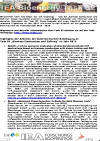
Herausgeber: Institut für Prozess- und Partikeltechnik
Deutsch, 4 Seiten
Downloads zur Publikation
IEA Bioenergy Task 32: Newsletter 01/2015
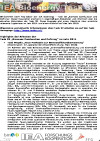
Herausgeber: Institut für Prozess- und Partikeltechnik
Deutsch, 5 Seiten
Downloads zur Publikation
e80^3-Buildings - Sub project 2: Concept development
Based on the selection of suitable demonstration projects in Subproject 1 an innovative concept for passive and active building envelopes and energy supply of so called "Plus Energy Buildings" (renovation) has been developed.
Erfolgreiche Beispiele aus der Programmlinie Fabrik der Zukunft
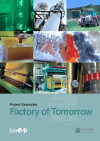
Herausgeber: Bundesministerium für Verkehr, Innovation und Technologie (BMVIT)
Englisch, 36 Seiten
Downloads zur Publikation
Sensitivity of System Design on Heat Distribution Cost in District Heating (2014)
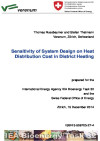
IEA Bioenergie Task 32
Thomas Nussbaumer, Stefan Thalmann
Herausgeber: Verenum und Schweizer Bundesamt für Energie
Englisch
Downloads zur Publikation
Multifunktionale Energieversorgung in Städten
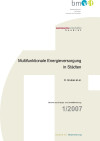
Schriftenreihe
01/2007
K. Gruber
Herausgeber: Bundesministerium für Verkehr, Innovation und Technologie
Deutsch, 124 Seiten
Downloads zur Publikation
"gugler! build & print triple zero" - subproject 2: building with recycros
Building with recycros is working out basics in order to close the cycle of materials in the building sector as well as to increase the usage of recycled materials (recycros). The existing material cycles in the building sector are going to be analysed. Furthermore, there will be a catalogue presented, covering the actual situation of which materials are used in today´s engineering and how the waste is treated. The project will be completed with a summary of results and a proposal of concrete materials and constructional systems for the building project gugler.
